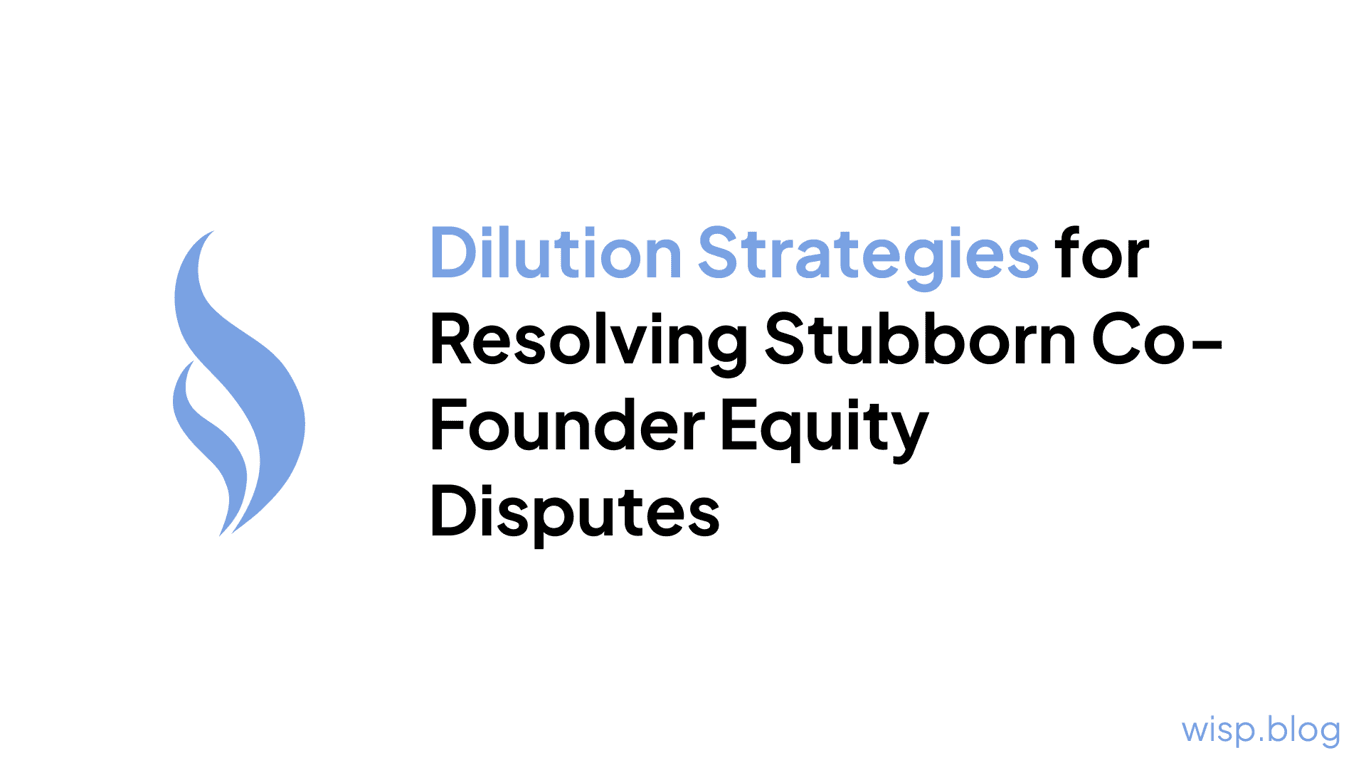
You poured your heart and soul into building this startup with your co-founder. Late nights, financial sacrifices, constant stress and grind. But now there's a rift. Your visions for the company have diverged, or one of you isn't pulling their weight. The relationship has become strained and dysfunctional. You're paralyzed by the fear of having to remove your co-founder and potentially killing the business you've nurtured for so long.
The emotional turmoil is overwhelming. This person was once your trusted partner, maybe even a close friend. You reminisce about those early days when you were unstoppable together, hyped up on the energy of turning your dream into reality. But now, the resentment, disappointment and conflict make it hard to even be in the same room.
You question everything - was it all a mistake? Did you miss red flags about their work ethic or competence? Should you have vetted them more thoroughly? The stress and negativity is sapping your motivation and making it impossible to fully focus on your business.
But what if I told you that this painful situation is actually a crucible of growth for you as a founder and leader? That by developing the right mindset and taking a systematic approach, you can neutralize the emotional landmines and cleanly separate from a co-founder if needed?
You don't have to let this turmoil derail your startup journey.
1. Emotionally Detach from the Situation
The first step is to remove your ego from the equation and view the situation objectively. Your co-founder's actions aren't a personal attack, even if they feel that way. Detaching prevents you from getting mired in negative emotions like anger, resentment and blame that cloud your judgment.
Example: Visualize the situation as an impartial third-party observer. What would their perspective be based solely on the facts and actions taken? Avoid inflammatory language and stick to specifics.
Pro Tip: Consider speaking to a therapist or coach to gain tools for emotional detachment. They can provide exercises to remove yourself from the situation mentally.
Common Pitfall: Lashing out or making heated decisions based on transient emotions. Detachment allows you to respond rationally.
2. Clearly Document Responsibilities and Equity
Review your operating agreement, vesting schedules, and any other documentation about roles, responsibilities and equity splits. Identify any violations or shortcomings from either party based on these agreed-upon terms. Gather evidence to make your case.
Example: If a co-founder was responsible for hitting certain milestones but failed to deliver, document specifics with dates, deliverables, and impact on the business. Or if they violated their vesting schedule by missing long stretches of work, calculate the amount of unvested equity.
Pro Tip: Speak to investors or advisors experienced with co-founder disputes. They can guide you on typical protocols and help interpret legal documents.
Common Pitfall: Not having documentation in place from the start. Verbal agreements lead to conflicting accounts later.
3. Seek Third-Party Mediation
If you can't resolve the issues through direct conversation, bring in a neutral third-party mediator. This could be a mentor, advisor, or professional mediator. They can facilitate tough conversations, identify root issues, and suggest compromise solutions.
Example: Investors or accelerator programs often have resources for founder mediation and conflict resolution. They can remain objective since they have no emotional stake in the situation.
Pro Tip: Agree in advance that you'll respect the mediator's final decision, even if it doesn't go fully in your favor. The cost of mediation is minimal compared to prolonged internal conflicts.
Common Pitfall: Coming to mediation with a hardline, uncompromising stance. You have to be open to working towards a resolution.
4. Explore Options for Separating
If mediation fails, be prepared to part ways. Consult a lawyer to understand options like founder removal, equity forfeiture, or negotiated buyouts. Have a solid rationale and paper trail documenting why this step is necessary.
Example: If a co-founder willfully violated their responsibilities, committed illegal or fraudulent actions, or effectively abandoned the company, you may be able to trigger termination and equity forfeiture based on the operating agreement.
Pro Tip: Read about strategies for "Dilution Strategies for Resolving Stubborn Co-Founder Equity Disputes" if your co-founder is digging in their heels about keeping equity.
Common Pitfall: Getting mired in a costly legal battle when a negotiated separation could have been reached.
5. Make a Clean Break
Once a decision is made, act swiftly and decisively. Remove the co-founder's operational involvement and access. But also have an agreed-upon public relations plan to explain the transition externally with minimal disruption.
Example: Immediately cut off access to accounts, documentation, and systems. But cooperate on an external communications plan to explain the transition to employees, investors, customers, and other stakeholders in a professional manner.
Pro Tip: Discuss with investors and advisors about replacing the departing co-founder's role and responsibilities on the team. You may need to backfill certain skills or capacities.
Common Pitfall: Letting the transition period linger, which breeds more resentment. Rip off the band-aid and move forward.
6. Regroup and Refocus
After the separation, take time to emotionally reset and realign your vision. Bring in new talent if needed. Refocus everyone's energy on making progress, not dwelling on the past. Use this as a catalyst to build stronger processes and culture.
Example: Spend a few days completely unplugged and disconnected from work. Use this mental reset to get past the negativity. Then bring the team together for a refocus on the company's core mission and priorities.
Pro Tip: Be transparent with the team about what happened and what's next. But keep the message focused on the future, not litigating the past.
Common Pitfall: Letting the previous conflict and negativity linger, damaging morale and momentum.
Co-founder conflicts are one of the most challenging situations an entrepreneur can face. But they don't have to be a death knell for your startup if you handle them the right way. By developing emotional detachment, documenting responsibilities, using mediation, and being prepared to make tough decisions, you can neutralize the turmoil and move forward successfully. The resilience and leadership skills you develop will be invaluable.


